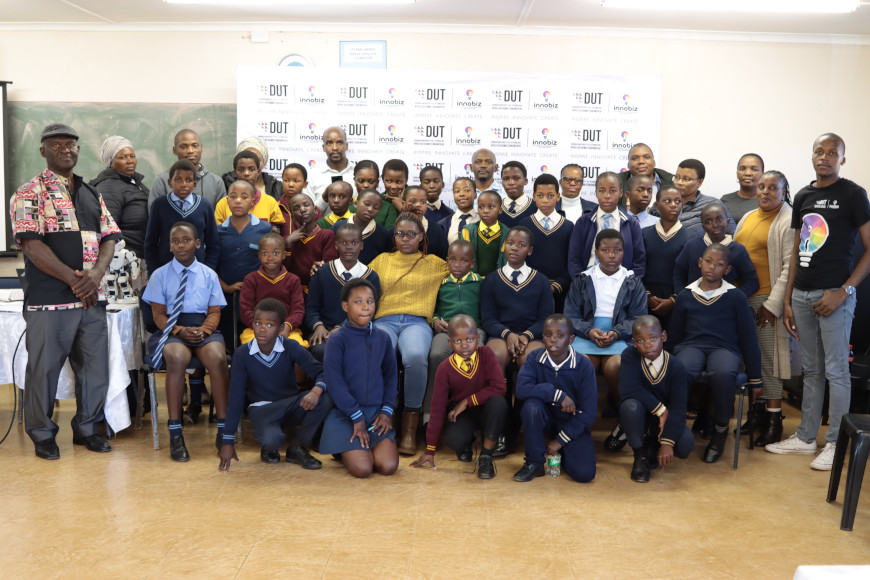The innobiz DUT Centre for Entrepreneurship and Innovation in collaboration with The United State Consulate General, The University of Alabama and The University of Maryland, invited 90 students from 18 schools to participate in its Coding for Kids Programme. The programme was held at Vumanhlamvu Primary School on the 11th and 12th of May 2023, as part of the Centre’s Adopt-a-School Programme.
This initiative designed to teach basic computer skills to learners from disadvantaged schools in rural Inkandla, speaks to the ENVISION2030s’ fourth strategy perspective, ‘‘society”. This perspective expresses the institutions commitment to impacting the livelihoods of its internal and external people, cultivating and sustaining a meaningful and mutually beneficial partnership.
The programme facilitated by innobiz IT Technician, Mr Sabelo Gumede, and Community Engagement Officer Mr Khothatso Memela, commenced with an introduction and welcome from the school’s inspector, Ms Lindumusa Sibiya; who expressed gratitude to the Durban University of Technology for choosing Inkandla for this programme.
“Our learners are very disadvantaged in terms of technological development; we are in the deep rural end of KZN, and I feel this programme will make a significant impact in the lives of our children. I would love to see this programme benefit even more schools in this region”. Her statements were supported by Vumanhlamvu Primary School principal Mr Willie Vilakazi, who also expressed gratitude to the Centre for introducing their learners to such opportunities.
innobiz DUT Agri-Specialist Dr Harry Swatson shared the purpose of the day, expressing that this collaboration will strengthen the relationship between South Africa and the United States of America and ensure more opportunities for the youth in disadvantaged arears. “Computers have become an indispensable part of modern life and this collaboration will provide youth in resource limited areas with opportunities to acquire technological skills that will allow them to advance their livelihoods”.
The programme covered an inadept look at the 4th industrial revolution presented by Khothatso Memela, the topic covered its effects on society and how it has contributed to changing and improving people’s livelihoods. This was an effort to inspire an interest in Science, Technology, Engineering and Mathematics (STEM) education and potentially suggesting it as a possible career choice.
This section was followed by a basic computer literacy workshop presented by Sabelo Gumede, covering basic terminologies, special keys, and their functions. This interactive session also included a practical activity co- facilitated by Agri-Tech student entrepreneur and founder of Eco-farming, Sabelo Dladla.
The learners were visibly excited and intrigued by the information and the activities offered in this programme. They shared words of gratitude to the institution and expressed wishes of participating in more programmes of this nature.
To conclude the programme, the learners were treated to an exciting drone technology practical activity, where they were allowed first-hand experience of the technological tool.
Pictured: Vumanhlamvu Primary school learners.
Khonzinkosi Magcaba

